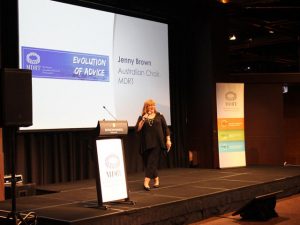Chris Unwin notes: “A job entitles you to have dreams about the lifestyle you would like, but an opportunity allows dreams to become goals which then become reality.” These two articles from Chris ask you to reflect – at least a little bit - on who you are and where you’re going, as Chris considers the Importance of Purpose and the Importance of Attitude...

The Importance of Purpose
“It’s just as hard to get somewhere if you don’t know where you’re going as it is to come back from somewhere you’ve never been!”
So, how possible is it to get somewhere if you don’t know where you’re going? Impossible
We’ve previously looked at the difference between a job and an opportunity and that difference could be summed up in one word, namely control. In a job someone else has control of your income, so someone else has control of your lifestyle, but in an opportunity you have control of your income, so you have control of your lifestyle.
A job entitles you to have dreams about the lifestyle you would like, but an opportunity allows dreams to become goals which then become reality.
A job entitles you to have dreams about the lifestyle you would like, but an opportunity allows dreams to become goals which then become reality. Being in the financial services industry is like being in the driving seat of a vehicle that can take you wherever you want to go. But where is that vehicle going to take you if you don’t know where you want to go?
Hence the importance of purpose:
Why did you get up this morning?
Do you let days happen or do you make days happen?
Do you live to work or work to live?
Once you have stumbled across an opportunity, it becomes absolutely crucial that you have a primary personal financial goal. I say personal financial goal as distinct from a business goal. In my experience business goals will usually be based on what it is that the individual wants to achieve/acquire in their personal life i.e. they are a business means to a lifestyle end.
In order to qualify as a goal rather than just something that would be nice as long as it’s not too hard, there are a number of criteria that need to be met:
- It needs to be something you REALLY WANT to the point of you being so excited about getting it that you would be physically sick if you don’t get it.
- It needs to be 100% crystal clear with no fuzzy edges because you need to be able to visualise it – Remember “What the mind of man can accurately conceive, it can achieve”.
- It needs to be realistic – this places no restriction on what your goal can be; it simply requires it to be achievable within a realistic timeframe – set it just out of reach but not out of sight.
- It needs to be date stamped – we all need an impending event
- Most important of all it needs to be irrespective – under what circumstances will you not achieve goal? Answer: none and it is this that distinguishes a goal from something that would be nice as long as it’s not too hard.

The Importance of Attitude
There are five component parts to the “Cycle of Success”, namely Activity, Appointments, Sales, Enjoying Life and the Right Attitude. All are essential pieces of the jigsaw, but only one of the component parts acts as the catalyst for all the others and without which the whole cycle breaks down. Do you know which one it is?
Provided you are in the right environment i.e. an opportunity not a job, then it is the right attitude that acts as the catalyst for everything else. The right attitude will produce the right level of activity which will in turn produce appointments which will produce sales which will create enjoyment of life which will maintain the right attitude.
Once all the component parts are connected the cycle is self-perpetuating and will continue unless the Right Attitude breaks down.
So, what is the right attitude? My view is that, if you had to sum up the right attitude in just one word, then that word would be belief, and it has to be 100% belief in 2 things – yourself and the opportunity. I don’t think anyone in our industry has any reason to have anything short of 100% belief in themselves i.e. 100% belief in our ability to do the job. There is nothing technical or complex about any of the more important aspects of our day to day activity – it just requires a genuine passion for what you are selling and a willingness to engage positively with other people.
100% belief in the opportunity simply means that you know that, provided the right attitude is engaged, then all the other components of the cycle of success will follow.
Our business is as hard or as easy as you make it. Let’s have a look at two distinctly different descriptions of our business. If you play a word association game with two different people in our business, one of whom is firing on all cylinders and killing it and the other can’t catch a trick and is struggling bigtime, and you say to them both “Describe to me the business you are in with a number of single words or phrases”, below are the results you will get:-
| Achieving Goals | Missing Budgets |
| Success | Failure |
| Sales | Objections |
| Helping People | Dealing with Idiots |
| Recognition | Pressure |
| Holidays | Work, Work, Work |
| Fun | Stress |
How can this be the same business, you ask,? And the answer is, yes, it’s the same business but the difference is attitude or mindset.
Let’s have a look at one more aspect of attitude before we finish up, and hopefully this will make your success in this business more achievable.
If you were to be asked “Why do sales people succeed?”, I would guess you would put it down to motivation, self-confidence and a goal orientated, positive attitude etc. But this knowledge does not in itself make you successful, does it?
In my time in this business I have witnessed literally hundreds of people recognise an opportunity (the hard part), give it a go and fail. So why do sales people fail? Not having motivation, self-confidence, goals and a positive attitude are merely symptomatic. I believe the real causes are:
- Rejection “THE BAD”
- FOWOPTOM – Fear of what other people think of me
- Call reluctance
These 3 things can be summed up in one word: APPREHENSION. 95% of apprehension in our business occurs at the prospecting stage → Less Apprehension (better mindset) = More activity (Cycle of Success).
I believe that the key to success is to get from a negative state of mind to a neutral state of mind in relation to “THE BAD” i.e. have more control over apprehension.
High achievers are NOT high achievers because they are positive about everything (how likely is that?!), but because they are neutral i.e. not bothered by “THE BAD”.

Chris Unwin is a financial adviser of 37 years standing and has been a specialist risk adviser for the last 22 years. His training and consulting business has operated for 12 years and it specialises in helping advisers across the full spectrum of experience with their client engagement skills, both in the risk advice specific space as well as in the more generic soft skills space.
…And if anyone would like to receive Chris Unwin’s Chrisisms on a fortnightly basis, just email him with your details, including the state in which you reside.
Contact or follow the author: Telephone: +61 417 281 034 | Website | Email | LinkedIn










